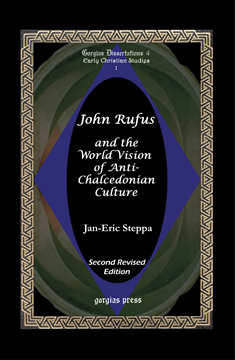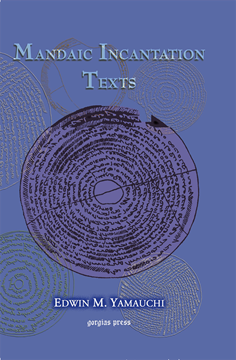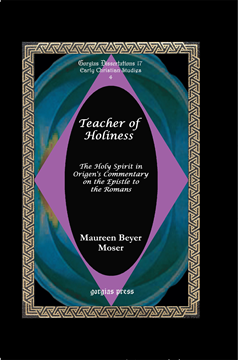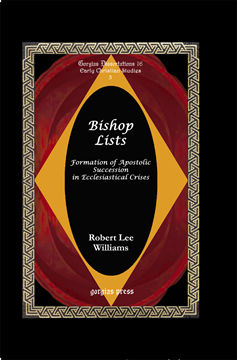John Rufus and the World Vision of Anti-Chalcedonean Culture
Second Revised Edition
ISBN: 1-59333-131-2
This book deals with the works of the anti-Chalcedonian hagiographer, John Rufus, and traces the basic motives behind the opposition against the council of Chalcedon in the fifth century through an attempt to reconstruct a specific anti-Chalcedonian culture. As part of the eastern monastic culture, it considered itself a counter-culture guarding purity of ascetic conduct and orthodoxy from being defiled by the perverseness of the majority. Reading John Rufus' hagiography, we find ourselves in the midst of a cosmological warfare between good and evil, where the great heroes of the anti-Chalcedonian movement enter into history as God's warriors against the rebellion of demons and heretics.
$142.00 (USD) $85.20 (USD)
Bible Places; or The Topography of the Holy Land
ISBN: 1-59333-142-8
This book aims to provide a brief, yet very informative description of every Holy Land site mentioned in the Bible. Relying on the extensive research of the Palestinian Exploration Fund, Tristram's work afforded a new and vividly descriptive perspective on the Holy Land.
$184.00 (USD) $110.40 (USD)
'The Blessed City'
By J. B. Segal
ISBN: 1-59333-193-2
This book describes events at Edessa, largely through contemporary accounts and incorporates much new material, notably six mosaics found by the writer between 1952 and 1959.
$159.00 (USD) $95.40 (USD)
Mandaic Incantation Texts
ISBN: 1-59333-192-4
This is a revision of E.M. Yamauchi's dissertation. It includes a collection of the earliest Mandaic texts, which are magic scrolls and inscribed bowls, dating from about 600 CE, together with transcriptions and translations, a grammar, and a lexicon.
$190.00 (USD) $114.00 (USD)
The Holy Spirit in Origen's Commentary on the Epistle to the Romans
ISBN: 1-59333-149-5
This book, on the pneumatology of Origen's Commentary on the Epistle to the Romans, illustrates the centrality of the Holy Spirit for his theological project. As both God's exitus into the world and humanity's reditus to God, the Spirit forms the crucial link between Origen's doctrine of God and his spiritual anthropology. Origen's images for the Holy Spirit, understood in the context of second century concepts of 'spirit,' convey the intersection of theology and anthropology in his thought. This book explores Origen's understanding of the multiplicity of spirits found in the Scriptures, with particular emphasis on the Holy Spirit as pivotal to God's outreach into the world.
$145.00 (USD) $87.00 (USD)
Formation of Apostolic Succession of Bishops in Ecclesiastical Crises
ISBN: 1-59333-194-0
Early lists of bishops, identified by Walter Bauer as "literary propaganda," mark critical points in the development of the doctrine of the apostolic succession of bishops. This study delves into the political struggles surrounding the lists and the doctrine they served to define. Ecclesiastical politics in each case reflects the threat to the bishop's authority and clarifies the meaning of apostolic succession in the Church's development. This social history approach, examining the function of the literature within its historical circumstances, reveals how theology developed from politics. The development is as gripping politically as it is illuminating theologically.
$154.00 (USD) $92.40 (USD)





